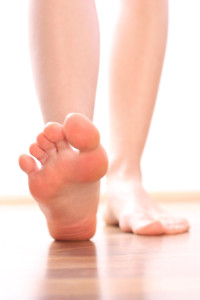 Marathon runner Peter Loong recently told a story about how he forgot his shoes before getting ready to compete. He was able to receive advice from a barefoot runner who gave him several tips and tricks in order to compete without sneakers. In regards to how he performed, Loong said, “I ran (barefooted) behind the group the whole way... At the end point, even I was shocked that I made it.” Nevertheless, it is no secret that barefoot running requires a certain technique. These runners are required to land on their heels first instead of on the balls of their feet, since this method tends to protect against injury. Loong says that he would not recommend any beginner barefoot runner to run a marathon because the technique takes a while to perfect.
Marathon runner Peter Loong recently told a story about how he forgot his shoes before getting ready to compete. He was able to receive advice from a barefoot runner who gave him several tips and tricks in order to compete without sneakers. In regards to how he performed, Loong said, “I ran (barefooted) behind the group the whole way... At the end point, even I was shocked that I made it.” Nevertheless, it is no secret that barefoot running requires a certain technique. These runners are required to land on their heels first instead of on the balls of their feet, since this method tends to protect against injury. Loong says that he would not recommend any beginner barefoot runner to run a marathon because the technique takes a while to perfect.
Barefoot running has its own share of benefits and disadvantages. If you have any concerns about your feet or ankles, contact one of our podiatrists from The Podiatry Center, PC. Our doctors will treat your foot and ankle needs.
Barefoot Running
The Impact of Barefoot Running
- Running without shoes changes the motion of your running, as most running is done by landing on the heel of the feet.
- Running barefoot requires a different way of running; the landing is done on the front part of the feet.
The Advantages of Barefoot Running
- When running and landing on the front feet, the impact on the feet and ankle is reduced; this can reduce stress injuries.
- It strengthens muscles in the feet, ankles and lower legs.
- Balance of the body is improved, and there is a greater sensory input from the feet to the rest of the body.
The Drawbacks of Barefoot Running
- No protection while running, makes it likely that runners will land on sharp objects and scrapes, bruises and cuts on the feet will result.
- Blisters may form.
- Possibility of plantar fascia problems.
- Risk of getting Achilles tendonitis.
So, what can runners do to make barefoot running safe? It’s best to make a slow transition from running shoes to barefoot running. Once the feet begin to adjust, try walking, then jogging and gradually increasing the distance. Minimalist running shoes may also be an option.
If you have any questions please feel free to contact one of our office located in Millburn, NJ. We offer the newest diagnostic and treatment technologies for all your foot and ankle needs.
Read more about Barefoot Running